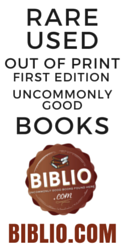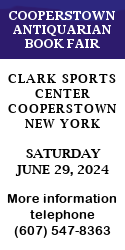Covering All the Bases
I attend fewer book fairs these days but Albany (NY) is only a two-hour drive from here and it provides a wonderful excuse for a Sunday drive in early November—as long as road conditions are good. For the past three years we’ve been lucky—good driving weather, plenty of free parking in downtown Albany and all of it on a pleasant Sunday afternoon.
We were very careful driving east along Route 20 because just a few weeks before I was given a traffic ticket for straying over the solid line while trying to avoid being sideswiped by another driver. For the rest of the journey that day we noticed the state police stopping cars nearly every fifteen miles all the way to Long Island and I still wonder if going after soft targets (it cost us $150.00) is the best way to solve New York’s budgetary problems. It could cure tourism the way hanging used to cure horse thieving.
The book fair itself was a considerable success in that the organizers accomplished all three of the goals they’d set for themselves—increased dealer participation, a larger number of fair-goers, and more money raised for the Albany Institute of History & Art through the silent auction. Not a bad base to build on during these uncertain times.
One of the good things about Albany and some of the other mid-sized regional book fairs is the wide range of material offered—everything from ordinary reading copies of books you’ve always wanted to read, intriguing books you didn’t know existed, or amazing rarities of historical or literary importance. Having been connected in one way or another to this business for a long time, lately I find myself buying more from the first two categories.
The election campaign is over, but shortly after the final vote count a vacuous individual (I almost said blond, which she was, but that would gratuitously insult all the intelligent blonds in the world who have long suffered the slings of outrageous slander), posing as a journalist, reminded her ABC television news audience that “it’s never too soon to think about 2012”. Really.
With this last national election I think the “major” t.v. networks have removed themselves from serious contention as the go-to source for what’s really going on in the world. The candidate interviews were less than informative, and in one case body language, a grim demeanor and an impatient tapping of the feet revealed more about the reporter than the person being interviewed. And while interviewing another candidate the same reporter would gush, giggle and fawn—everything short of making romantic overtures.
At any rate the new president has inherited a terrible mess and we all should wish him the very best—that this will result in a sounder economic and a wiser foreign policy remains to be seen.
The conventional wisdom is that the Internet has replaced television as the most relied upon and reliable source of news and information. I think this is only partially true. In my opinion the clear winner is the printed word whether it appears in a book, magazine or newspaper or on an Internet site. With the printed word, we have access to vast and diverse sources of information—with television news we get the journalistic equivalent of a push poll. In “We Can’t be Too Careful About the British Public” D.H. Lawrence sums it up pretty well— “its perambulator has to get bigger and bigger...and the feed of pap that we nurses and guardian angels of the press have to deal out to it gets bigger and bigger...”
Our featured article this time is Michael Pixley’s Islam As It Was, (part one of a two-part series). Michael is an antiquarian bookseller living in Annapolis, Maryland (Eastern Approaches Books) and before that was with the State Department for nearly 25 years, working most of the time in Iraq and Turkey.
The spelling of some of the persons and places may be unfamiliar to readers but that’s because there’s no “correct” orthography for words transliterated from a language using a different alphabet—in this case mostly Arabic. Mr. Pixley labors under the disadvantage of knowing both Arabic and Turkish and his English spellings come closest to what they would sound like in the original. In the Preface to Seven Pillars of Wisdom T. E. Lawrence’s publisher raised questions about Lawrence’s spelling of certain persons and places.
Q. – F. who is reading the proofs...finds these...full of inconsistencies in the spelling of proper names...
T.E.L. – Arabic names won’t go into English, exactly, for their consonants are not the same as ours, and their vowels, like ours, vary from district to district...
Q. – Slip 1. Jeddah and Jidda used impartially throughout. Intentional?
T.E.L. – Rather!
Q. – Slip 16. Bir Waheida , was Bir Waheidi.
T.E.L. – Why not? All one place.
Q. – Slip 20. Nuri, Emir of the Ruwalla, belongs to the “chief family of the Rualla”. On Slip 23 “Rualla horse”, and Slip 38, “killed on Rueli”, In all later slips “Rualla”.
T.E.L. – Should have also used Ruwala and Ruala.
Q. – Slip 28. The Bisaita is also spelt Biseita.
T.E.L. – Good.
Q. – Slip 47. Jedha, the she-camel, was Jedhah on Slip 40.
T.E.L. – She was a splendid beast.
Q. – Slip 53. “Meleager, the immoral poet”, I have put “immortal” poet, but the author may mean immoral after all.
T.E.L. – Immorality I know. Immortality I cannot judge. As you please: Meleager will not sue us for libel.
Q. – Slip 65. Author is addressed “Ya Auruns”, but on Slip 56 was “Aurans”.
T.E.L. – Also Lurens and Runs: not to mention “Shaw”....
Q. – Slip 78. Sherif Abd el Mayin of Slip 68 becomes el Main, el Mayein, el Muein, el Mayin, and el Muyein.
T.E.L – Good egg. I call this really ingenious.
In his article, Mr. Pixley has dared the impossible—to attempt a thumbnail-sized overview of nearly 1500 years of Islamic history, from the Umayyids, Abbasids, minor kingdoms arising before and following the breakdown of the western Caliphate, the Mongol destruction of Baghdad and wholesale slaughter of its population, the Cairo based Mameluke caliphate, and the rise of the Ottoman Empire. It was difficult compressing so much in so little space and the remainder of the article will appear in our March/April issue. We hope that the piece will encourage readers to want to know more and we’ve asked Mr. Pixley to append a short bibliography to his second and final installment.
You will be pleased to know that Fine Books & Collections is not entirely abandoning paper and print for the Internet, but is planning to reduce its print schedule from bi-monthly to annually, according to a notice posted on their website. Their efforts will be directed towards on line publishing where lower production costs and the realities of the market place, combine to make perfect economic sense. With their six year run, I believe FB&C outlasted Biblio, another quixotic attempt to introduce the general public to the larger book world, of which the antiquarian side plays such an important part.
The simple reality is that the general antiquarian book trade has found it difficult to support magazines with glossy newsstand production values for very long. Our own survival for nearly 25 years has been helped along by controlling production costs, offering the trade added exposure in return for their subscription support, maintaining affordable ad rates, and financing growth out of savings rather than bank-borrowings—the latter a decidedly old fashioned way of running a business, for which we have been roundly ridiculed on more than one occasion.
Even though, like many other publications, we’re gradually giving more attention to our website (originally proposed and set up by our daughter Margaret who lives in Virginia) we’ll offer a paper and print edition for as long as it makes economic sense. To paraphrase PBS, we hope to continue, thanks to subscribers like you.
Nuts and Bolts
“Booksellers’ Gulch” (on www.booksourcemagazine.com) has turned out to be something of a success judging by what we’ve been hearing from people who appreciate our on-line simulation of the old fashioned book-buying road trip. Short of jumping into your car and driving cross country, it’s the next best thing to visiting dozens of antiquarian bookshops in person—our magazine website is your driver’s seat and the gas mileage is pretty good. For booksellers it’s even better—apart from being a subscriber to this magazine, it costs nothing to join the fun.
Our next project for the website, and possibly up and running by the time you read this, is a yet-to-be-named book club page that was suggested by another daughter who lives on Long Island. (We’re even thinking about calling it “Maricela’s Book Club Page”).
Book clubs are something of a phenomenon these days and a welcome one at that—we belong to one of the seven presently active in our little village. The nearby town of Hamilton has several, one of them devoted to the works of Jane Austen and run by a woman from the Colgate University bookstore.
The new page will serve several purposes—first, it will offer the simple function of a public bulletin board. Book club representatives posting details about their meetings will include title and author of the current or future selections, time, date and location of the next meeting, plus any optional information, including reaction or critical commentary, that might be useful to members of other book clubs or anyone else who’s thinking about reading the same book. As the page gains traction we hope for constructive feedback and suggestions as to how its usefulness can be improved.

























